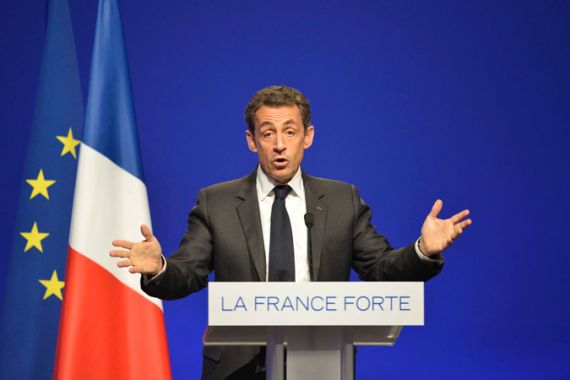For the sake of Europe, Sarkozy must stand down
Sarkozy has repeatedly pushed an Iran policy that exacerbates a root cause of the continent’s economic malaise.

Washington, DC – As nuclear talks between Iran and the P5+1 commence, both sides are talking tough in public to mask their private urgency. The US continues to reiterate that the “window for diplomacy” is fast closing, while the Iranians have made a play to have negotiations take place in Baghdad, Damascus or Beirut – a not-so-subtle swipe at the waning influence of the US in key regional outposts where Iran has pull.
As the conflict escalates, the US, Iran and Israel almost always occupy the headlines. However, no less important – but much less understood – is the complicating role being played by France under President Nicolas Sarkozy.
From the outset of the Obama administration’s efforts to resolve the nuclear dispute diplomatically, Sarkozy positioned himself to the right of the US president. While Europe by and large welcomed Obama’s new approach, there was “unease” and “apprehension” in Paris that Obama would go soft on Iran.
In early 2009, when Obama had just entered office, Sarkozy pushed the EU to impose sanctions prior to diplomatic efforts. The bid failed, due to resistance from other EU states who felt that Sarkozy’s strategy would undermine Obama. “Going in hawkish on the European side while Obama was stretching out his hand would certainly undermine the credibility of the outstretched hand,” a senior diplomat (from none of the EU3 countries of the UK, France and Germany) told us in 2010.
Later, when Obama was preparing a fuel swap proposal, Sarkozy resisted once more. France viewed the proposal as “extremely dangerous” since it could legitimise Iranian enrichment, preferring instead the zero-enrichment objective of the Bush administration. Less than a year later, Sarkozy opposed a revised fuel swap deal negotiated by Turkey and Brazil. Just a few weeks ago, France resisted US-led efforts to arrange the scheduled P5+1 talks with Iran, arguing that Iran’s acceptance letter wasn’t adequate.
|
|
Throughout this period, France has pushed against diplomatic compromises and advocated escalation. Sarkozy was at the forefront of pushing for an EU oil embargo on Iran at a time of record high prices, rising demand in Asia and most of Europe on the verge of economic collapse. The economies of Greece, Italy and Spain are on life support – and they were among the leading EU importers of Iranian oil. Sarkozy’s poor economic management is equally damaging at home, with France’s own credit rating downgraded after nearly five years under his watch.
Few allies
Rather than take steps to calm international markets, lower oil prices and help repair France’s economy, Sarkozy has repeatedly pushed an Iran policy that exacerbates a root cause of Europe’s economic malaise.
In his intransigence, Sarkozy has few allies besides Israeli Prime Minister Binyamin Netanyahu (who Sarkozy believes is a “liar”). Both men insist upon zero enrichment on Iranian soil – a capitulation to which Iran will not succumb, and a departure from the US tacit acknowledgement of indigenous Iranian enrichment at the 3.5 per cent level.
President Obama is left with the daunting task of trying to hold together an inherently unstable international coalition against Iran, find political will and space for sustained negotiations, and walk back overheated war rhetoric. “With friends like these…” is increasingly becoming a mantra amongst current and former US officials alike.
Patience and perseverance are needed in any negotiation. This is not unique to the West or Iran. And yes, Iran won’t play fair. Iranian recalcitrance is both well documented and a cause for concern. It can be expected to leverage loopholes and missteps throughout the negotiation process – but an honest assessment of prior negotiations shows that Sarkozy won’t miss an opportunity to do the same.
Negotiations involving the US and Iran are already fraught with complications. Now that we have a new opportunity to step back from the precipice of war, it’s time for Sarkozy to stand down and let the adults in the room take risks for peace – and for economic recovery.
Reza Marashi is Research Director at the National Iranian American Council and former Iran Desk Officer at the US Department of State.
Trita Parsi is President of the National Iranian American Council and author of A Single Roll of the Dice: Obama’s Diplomacy with Iran.